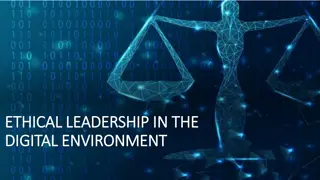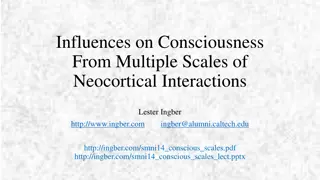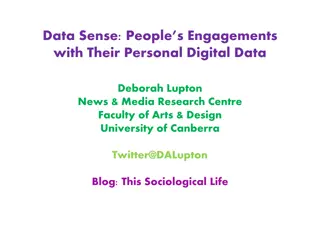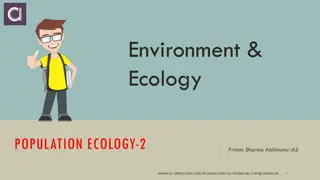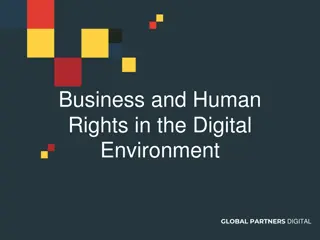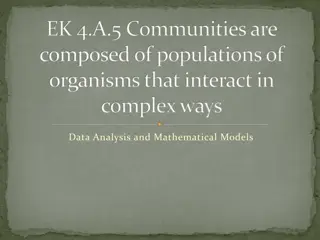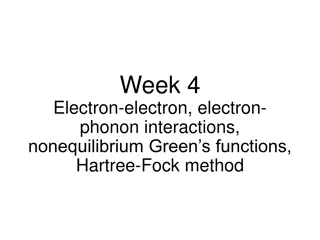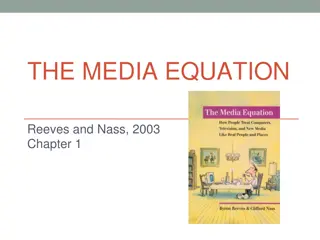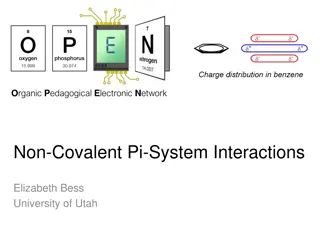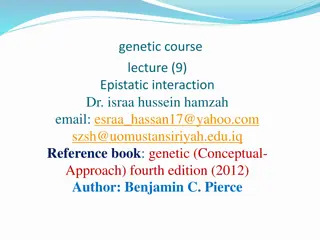Approaches in Studying Human-Environment Relationship
Explore different approaches to understanding the dynamic relationship between humans and their environment, including deterministic, teleological, possibilistic, and economic deterministic perspectives. These approaches shed light on how human actions and interactions with the environment have evol
1 views • 9 slides
Understanding Virus-Cell Interactions: Mechanisms and Consequences
Viruses interact with host cells in various ways, encoding genes that manipulate cell functions for their benefit. These interactions can range from benign to lethal outcomes. Factors influencing these interactions include viral factors, cellular responses, and the presence of virulence factors. Dif
0 views • 37 slides
Understanding Ecology: Interactions Between Organisms and their Environment
Ecology is the scientific study of how living organisms interact with each other and their environment. It delves into the relationships between biotic and abiotic factors, encompassing topics such as the distribution and abundance of organisms, structural adaptations, behavior under natural conditi
2 views • 42 slides
Exploring Particles and Fundamental Interactions in the Universe
Delve into the intricate world of particles and fundamental interactions in the Universe as explained by Professor Emeritus George Lazarides from Aristotle University of Thessaloniki. Discover the structure of matter, classification of particles based on interactions, constituents of hadrons, conser
1 views • 36 slides
Understanding the Business Environment and its Impact
Davis and Keith define the business environment as the aggregate of all conditions, events, and influences affecting a business. It is a multi-faceted and dynamic entity with far-reaching impacts requiring adaptability. The inter-relationship between business and its environment is vital for surviva
9 views • 15 slides
Understanding Hyperfine Interactions in Atomic Physics
Hyperfine interactions play a crucial role in atomic physics, leading to small energy shifts and splitting of degenerate levels in atoms and molecules. These interactions involve the electromagnetic multipole interactions between the nucleus and electron clouds, resulting in the splitting of energy
13 views • 154 slides
5 Medical Cannabis Interactions Every Physician Must Understand
As medical cannabis becomes increasingly integrated into healthcare practices, itu2019s imperative for physicians to be well-versed in potential interactions with other medications. While cannabis offers promising therapeutic benefits, its interactions with certain drugs can pose risks to patients.
1 views • 2 slides
Evolution of Human-Environment Relationship Through History
The evolution of human-environment relationships can be traced through four key stages - from hunting and food gathering in early human history to the modern era of science, technology, and industrialization. Each phase reflects changing attitudes towards nature and resource utilization, highlightin
0 views • 10 slides
Impact of Human Population Growth on Environment and Welfare
The rapid growth of the human population is placing immense pressure on the environment, leading to increased demand for resources like food, water, and shelter. The effects of human activity on the environment have escalated significantly over the years due to population expansion. High birth rates
1 views • 8 slides
Understanding Ethics and Leadership in the Digital Environment
Ethics, leadership, and the digital environment are interconnected concepts shaping interactions in today's world. Ethics defines right and wrong, guiding both individuals and organizations in decision-making. Leadership involves influencing and inspiring others towards a vision. In the digital envi
1 views • 11 slides
Understanding Human-Environment Interaction: Environmental Determinism vs. Possibilism
Human-environment interaction is a two-way process shaping cultures and behaviors. Explore the theories of environmental determinism and possibilism, which offer contrasting views on the influence of physical conditions on human societies. Environmental determinism emphasizes the impact of the envir
2 views • 18 slides
Exploring Influences on Consciousness Through Neocortical Interactions
Delve into the intriguing realm of consciousness with Lester Ingber's research on the influences stemming from multiple scales of neocortical interactions. The investigations cover various aspects such as mind over matter, recursive interactions, neuronal scales in the neocortex, and statistical mec
1 views • 41 slides
Understanding Media Ecology: Impact of Communication Technology
Media ecology is a theoretical concept analyzing the influence of media and communication technology on human culture. Neil Postman, a prominent figure in the field, delves into how communication media affect human perception, understanding, and values. This study views media as environments shaping
6 views • 23 slides
Understanding Geographical Space in Geography Studies
Geographical space in geography encompasses natural and social elements, defining locations, and interactions essential for comprehending the world. Space and place influence various aspects such as economics, health, and climate. Geographers explore spatial distribution, processes, and human-enviro
0 views • 20 slides
Principles of Ecology: Understanding Organism-Environment Interactions
Ecology is the scientific study of how living organisms interact with each other and their environment. It involves understanding organisms at their native habitats, from individuals to ecosystems. The discipline encompasses various branches and focuses on the relationships shaping the distribution
1 views • 14 slides
Understanding the Business Environment and its Impact on Education
The business environment encompasses all external and internal factors that influence a business. It is dynamic, multi-faceted, and requires adaptability for survival. Businesses interact closely with the environment, with limited capacity to influence it. The components of the internal environment
3 views • 20 slides
Understanding Organisational Behaviour: Models and Concepts
The study of Organisational Behaviour (OB) explores human behavior within organizational settings, analyzing interactions at individual, group, and organizational levels. Key topics include the meaning of OB, its definition, and various models such as the S-R Model and S-O-B-A Model. This in-depth e
1 views • 19 slides
Understanding Human Nature and Individual Differences in Foundation of Human Skills
Explore the foundational concepts of human behavior, individual differences, and organizational culture in the study of human skills. Delve into topics such as human nature, personality, attitudes, intelligence, and learning in Prof. Muskan Jeswani's course. Understand the significance of inter- and
0 views • 11 slides
Understanding Diffraction Processes and Meson Production in Nuclear Interactions
Exploration of diffraction dissociation of nuclear nucleons in nucleus-nucleus interactions using Geant4 FTF model and NA61/SHINE results for various nucleus combinations. Insights into meson production in argon-nucleus interactions at different energies and the impact of models like DCM/AGT, UrQMD,
0 views • 17 slides
Exploring Human-Animal Interactions through 25 Years of Quality Research
Delve into the interdisciplinary realm of human-animal interactions with a focus on social sciences and quantitative research. Discover key themes such as social psychology, therapy, animal welfare, and more. Explore attitudes and personality differences related to animal treatment, empathy, and bel
1 views • 26 slides
Understanding Interactions in Ecology
Living things interact with their environment and each other in various ways, leading to concepts like population dynamics, limiting factors, and species interactions such as competition, coevolution, predator-prey relationships, and symbiosis. These interactions shape ecosystems and influence the s
0 views • 9 slides
Exploring Human-Data Interactions in Personal Digital Data Engagements
Delve into the intricate world of human-data interactions in the realm of personal digital data engagements. Investigate how individuals use and perceive their digital data, exploring the intersections of technology, data usage, and human life. Discover the vitality of digital data in shaping our so
0 views • 19 slides
PuReMD Design - Initialization, Interactions, and Experimental Results
PuReMD Design involves the initialization of neighbor lists, bond lists, hydrogen bond lists, and coefficients of QEq matrix for bonded interactions. It also implements non-bonded interactions such as charge equilibration, Coulomb's forces, and Van der Waals forces. The process includes the generati
0 views • 23 slides
Understanding Epistasis: Genetic Interactions and Their Implications
Epistasis is a phenomenon where the phenotypic expression of one gene is influenced by interactions with another gene. This concept, first introduced in 1909, plays a crucial role in genetics, affecting various traits and evolutionary processes. The difference between dominance and epistasis lies in
1 views • 41 slides
Understanding UML Sequence Diagrams
UML Sequence Diagrams illustrate high-level interactions between class instances in software programs. They represent method calls and interactions among objects during program execution. The diagrams show interactions for specific circumstances like startup or button clicks. Each class/object is re
0 views • 8 slides
The Link Between Democracy and Human Rights
The core of democracy lies in promoting equal human worth and self-determination. There is a strong connection between human rights, democracy, good governance, and development. Democracy allows people to participate in decision-making, ensuring their views are heard. It upholds freedom, equality, f
0 views • 15 slides
Understanding Social Neuroscience: Exploring Human Sociality and Well-Being
Social neuroscience delves into how the brain processes social interactions and their impact on human well-being. It focuses on the interconnectedness between social connections and overall life satisfaction, suggesting that humans are inherently social beings with a strong need for social belonging
3 views • 21 slides
Comparison of Models of Nucleus-Nucleus Interactions in CORSIKA
Introduction to the study on models of hadronic interactions at high energies implemented in CORSIKA, a simulation tool used to analyze cosmic ray interactions with Earth's atmosphere. The study compares four widely used models, detailing their features and variants in simulation parameters. Results
0 views • 10 slides
Population Interactions in Nature: Competitive and Cooperative Interactions
Every population, whether animal or plant, engages in competitive and cooperative interactions to fulfill their needs for food, shelter, and resources. Intraspecific competition is common among individuals of the same species, leading to a struggle for survival. Interspecific interactions also play
0 views • 17 slides
Weak Interactions and Hydrogen Bonding in Molecular Forces
Exploring van der Waals forces, hydrogen bonding, and weak interactions in intermolecular forces and surface interactions. Understanding interactions between backbone peptide groups and orientation dependence of hydrogen bonding through dispersion forces and repulsive potentials.
0 views • 22 slides
Understanding Intermolecular Forces in Chemistry
Interactions between static charge distributions in chemistry are governed by Coulomb's Law, playing a crucial role in understanding intermolecular forces. From ion-ion interactions to charge-dipole and charge-quadrupole interactions, the strength of forces varies based on factors like distance and
0 views • 21 slides
Understanding Use Cases and Actors in System Design
Explore the concept of use cases in system design, including user goals versus interactions, system boundaries, actors, and how they all come together in use case diagrams. Learn how use cases capture user-visible functions, achieve discrete goals, and represent the interactions between actors and t
0 views • 20 slides
Exploring the 5 Themes of Geography
Understand the fundamental concepts of geography through exploring the 5 themes: Location, Place, Human-Environmental Interactions, Movement, and Regions. Learn about relative and absolute location, human and physical characteristics of places, interactions between humans and the environment, moveme
0 views • 10 slides
Business and Human Rights in the Digital Environment: Key Principles and Action Plans
This content discusses the importance of business and human rights in the digital environment, focusing on pillars such as the state's duty to protect, corporate responsibility to respect, and national action plans. The principles under these pillars emphasize the need for states to prevent human ri
0 views • 15 slides
Understanding Population Interactions in Communities
Communities are made up of populations of organisms that interact in various ways, shaping the structure of the community. Population interactions include predator-prey relationships, symbiotic interactions like mutualism and commensalism, parasitism, and competitive exclusion. These interactions in
0 views • 25 slides
Enhancing Transparency in Human Rights Performance Measurement
This information focuses on initiatives like the Human Rights Measurement Initiative (HRMI) that aim to provide new data for researching and advocating human rights issues globally. The HRMI project, founded in 2015, collaborates with various stakeholders and is funded by philanthropic grants. It em
1 views • 19 slides
Quantum Interactions: Electrons, Phonons, and Hubbard Interaction
Exploring the complexities of electron-electron and electron-phonon interactions, nonequilibrium Green's functions, Hartree-Fock method, Coulomb's law, quantum operator forms, Hubbard interaction, and electron-phonon interactions from first principles. The interactions delve into the behavior of cha
0 views • 20 slides
Understanding Human Interaction with Media - The Media Equation by Reeves and Nass
Research from "The Media Equation" by Reeves and Nass explores how humans interact with media, treating it as if it were real life. The hypothesis posits that humans respond to media just as they do to real-world interactions. Examples illustrate how individuals engage with various forms of media, e
0 views • 15 slides
Understanding Non-Covalent Pi-System Interactions in Molecular Structures
Non-covalent interactions play a crucial role in chemical selectivity and molecular recognition. This article discusses the significance of Pi-system interactions, including Pi-Pi and Cation-Pi interactions, in stabilizing molecular structures like DNA helices and G-quadruplexes. Insights into molec
0 views • 6 slides
Genetic Interactions in Chicken Combs: Epistatic and Non-Epistatic Examples
In chicken genetics, epistatic and non-epistatic interactions play a crucial role in determining comb size and shape. Bateson and Punnett's studies on fowls revealed how different gene pairs interact to produce distinctive phenotypes. Epistatic interactions, such as dominant epistasis, influence the
0 views • 16 slides









